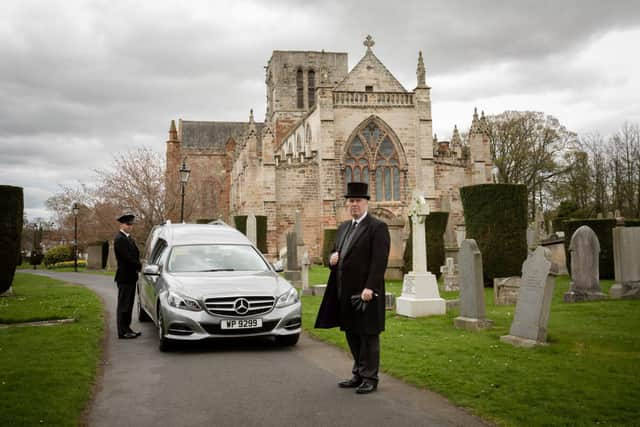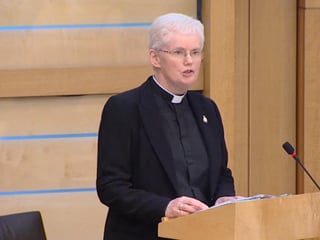Scotland's funeral directors unite in public request to 'stop and bow' for passing hearses during Covid-19
The coronavirus pandemic means crematoriums and cemeteries placing restrictions on how many people can attend funerals, with new legislation only allowing for immediate family.
But Scotland’s leading funeral directors are now uniting to ask the public to revive an old tradition of stopping and bowing as hearses go past on the street, in a collective show of support to bereaved families.


Advertisement
Hide AdAdvertisement
Hide AdEdinburgh-based funeral directors William Purves are among those sharing the request on social media.
Their message reads: “Could we ask you to join people all over the country resurrecting this old tradition as we make our way to funerals with very few people attending?
“If you see a hearse, could you stop, stand for a moment as it passes, perhaps take off your cap, and bow your head?
“In these times where funerals are restricted, our chance to support people during bereavement is limited. So, we wondered if we could revive an old tradition that would show people that their loss is noticed and shared by us all?
“It would mean the world to families in a time of sadness.”
‘It’s triggered a movement’
Speaking to The Scotsman on Tuesday, a William Purves spokeswoman said: “We have seen on Facebook and in the funeral sector press that lots of funeral directors are saying ‘yes, in my area please do this,’ and it has triggered a bit of a movement – and it’s a good movement.
“We are all in this together and treating this if we are one community and, if the family can not attend, then you are representing that family when seeing the coffin and stopping and bowing in the street.”
It is understood the National Association of Funeral Directors first shared the public request on behalf of an English funeral director about 10 days ago.
The spokeswoman for William Purves said they were among the first north of the border to share the message. Their decision to do so was also triggered by a recent funeral procession whereby a street of neighbours stood at their gates and clapped to pay their respects when a hearse went to the family home for a drive past.
Advertisement
Hide AdAdvertisement
Hide AdOther funeral directors in Scotland are sharing similar requests for people to stop and pay their respects, including Falkirk-based John O’Connor Family Funeral Directors.
Their Facebook message reads: “In these times where funerals are limited to only a very few close family, our chance to support people during bereavement is limited. So, we wondered if we could revive an old tradition that would show people that their loss is noticed and shared by us all?
“It would mean the world to families in a time of sadness.”
Co-op Funeralcare, which has offices in Edinburgh, is also sending out the message.
A spokeswoman said: “Although, sadly, funeral services must be restricted to ensure everyone’s safety, there are still ways communities can show their respect for the lives lost during this devastating time.
“Co-op Funeralcare is asking those who see a hearse passing by to stop and pay their respects; reviving an old tradition that was lost along the way. Whether it’s by removing your hat, nodding your head, or taking a bow, we would love to see as many people as possible showing this simple act of respect to honour the lives we have lost.
“It’s extremely important for communities to come together, now more than ever, to support one another during a time of great loss and grief, and we feel this simple form of respect can help us do this.”
The Scottish Government’s guidance on funerals has been changing rapidly in recent weeks as restrictions due to the virus have tightened, initially with the stopping of social gatherings, then limiting attendance to 10 people and then to immediate family members like parents, spouses and children.
The new coronavirus legislation limits those able to attend to members of the deceased’s household, close family members or, if no-one in these categories is attending, a friend of the deceased.
Advertisement
Hide AdAdvertisement
Hide AdHowever, if you are self-isolating, or if you are in any of the "high-risk" categories, then you are being told to stay at home.
The spokeswoman for William Purves says crematoriums and cemeteries have been making the sensitive decisions about who can go to funerals. She said that, in their experience, an average of just two close family members have been attending.
‘Numbers are up but we’re coping’
Funeral directors across Scotland are doing their best to make funerals more accessible to bereaved family members unable to attend, with options such as live streaming at crematoriums and filming at burials.
Coffin keepsakes are another way for families to say goodbye if they are unable to attend, with items from jewellery to books and clothing or children’s drawings – although these things are not uncommon anyway.
The William Purves spokeswoman also said that, due to the impact of coronavirus on deaths, there’s been a rise in the number of funerals taking place.
She added: “There is no doubt that numbers are up, but I think we are coping. Everybody in the sector has been busy but it’s not been crazy.
“Extra facilities are being developed in some parts of the central belt but I don’t believe any of these are required at the moment. We are limited capacity at the moment but have full staff and are servicing everybody’s needs.
“Families have been very tolerant of the changes as they have come in, we are seeing people being very strong.”
Advertisement
Hide AdAdvertisement
Hide AdWilliam Purves is also still providing embalming and viewing services to enable family members who may be self-isolating to say their final goodbyes, including for relatives of people who have died from Covid-19.
